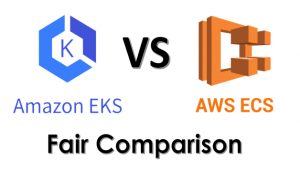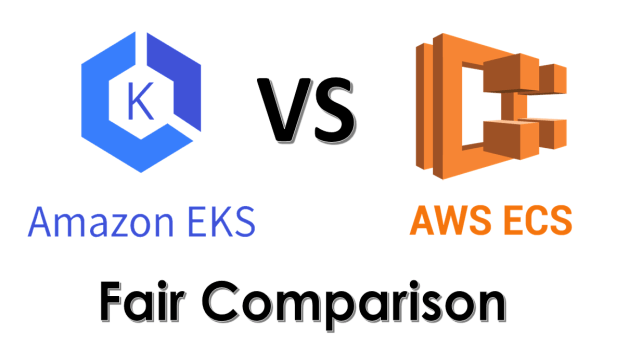Last Updated on: 28th February 2021, 10:32 am
In this article we will discuss Amazon ECS vs EKS, as you know cloud computing is getting popular amongst the developer community because of its on-demand availability of computing services with high security.
Amazon Web Services (AWS) is one of the big players in this area. However, ECS and EKS are two services provided by AWS. One may choose among Amazon ECS vs EKS depending on the nature of the project.
What is Amazon ECS?
Amazon Elastic Container Service (ECS) is a cloud computing service offered by AWS that virtually manages software also known as containers.
Developers can smoothly run or control scalable applications that run on many servers. It is one of the most popular cloud computing services among developers because of its security, reliability, and scalability.
What is Amazon EKS?
Amazon Elastic Kubernetes Service (Amazon EKS) is a service that allows a developer the flexibility to start, run, and scale Kubernetes applications using AWS cloud service.
Companies like Intel, Autodesk, GoDaddy, etc., use Amazon EKS to deploy their sensitive and critical applications.
Comparison Between Amazon ECS and EKS

Ease Of Deployment
ECS is straightforward to deploy and manage as it has fewer moving parts and components than EKS. After setting up, it is easy to deploy and control by using AWS console.
ECS is simpler because it was specially made for the AWS environment. This is why users can easily set up and interact with their application with their available AWS management console.
In contrast, EKS has a bit complex deployment configuration. After setup, users need to use the Kubernetes control plane to configure and deploy pods. It requires:
Security
While security is a critical concern in cloud computing, AWS offers Identity and Access Management (IAM) for its services. It allows users to access AWS services and resources securely.
Both ECS and EKS have IAM per task/ container. This means users need to go through IAM before every task in every container, making it more secure for developers. Before 2019, IAM was not supported by EKS per container use.
Compatibility
ECS is an Amazon-owned technology, and EKS uses Kubernetes, an open-source service developed by Google. Any cloud provider can use Kubernetes. So, it is clear that EKS is more versatile and compatible than ECS.
As ECS is neither open source nor uses Kubernetes, it may not have the same compatibilities as EKS. ECS is only AWS exclusive service.
Multi-cloud
Multi-cloud has become a hot topic in cloud computing these days. Multi-cloud systems provide users disaster recovery and high availability assurance. Single server/ cloud depends on availability zones or regions, but the multi-cloud system goes beyond that. It gives users an extra benefit.
Amazon ECS doesn’t provide multi-cloud benefits as it is only AWS-compatible. On the other hand, EKS does not have the same issues as ECS. Although AWS does not offer multi-cloud as EKS is open source and uses Kubernetes, it provides a greater range of options.
Amazon ECS vs EKS Pricing
Both in the ECS case and EKS, users only need to pay for the resources utilized by each container. ECS does not require any additional charge for using AWS Elastic Computing (EC2) or serverless computers using Farget. Users only pay for resources they create on the store.
The same goes for EKS, but the user needs to pay for using master nodes. These master nodes run across different availability zones.
The minimum cost for this service is 75 USD per month. It gives the user access to use 1 Amazon EKS cluster with a standard 3-node configuration; the price goes up if the user uses multiple clusters.
Networking and EC2 Container Capacity
ECS and EKS have different types of Elastic Network Interfaces (ENI) allocations. It is the difference between the limit of task/pods per EC2 instance.
ECS allows users to assign ENI directly to the task by AWS VPC mode. It limits the number of containers that can run in one instance. The number is around 24-120 ENI’s, depending on the instance user is working on.
EKS has a specific network interface that is mapped to Pod. It means the same internal network and public IP can be assigned to all the containers running in the same Pod.
One ENI can be shared with multiple Pods. This means in EKS; each user is allowed to load up to 750 Pods per instance. Comparing to ECS, the number is 120 tasks per instance.
Community and Support
As ECS is an amazon owned service, it does not have a large community such as other open-source platforms. But users will get official support from AWS regarding any ECS issue.
On the other hand, EKS is based on Kubernetes, which is an open-source system. Like any other open-source platform, Kubernetes has a huge ever-growing community.
Having such a widespread community is very useful for new users as well as expected developers.
Namespaces
The Namespace is a feature that helps users isolate workloads running in the same cluster. It might sound insignificant but has a lot of advantages while working.
For instance, users can have two different namespaces running in the same cluster, simultaneously sharing resources across environments. This reduces the spare capacity in the cluster user is working on. Kubernetes offers this ‘Namespaces’ feature.
On the contrary, ECS does not offer any features like Namespaces.
Also Read: What will data scientist career look like in 2021?
Final Words For Amazon ECS vs EKS
ECS and EKS are both well-built container orchestration solutions. ECS is relatively more straightforward than its counterparts.
For new users, ECS can be the right choice because of its simplicity and availability. ECS is preferable for small deployments. It has a free control plane that does not charge any fees to start working on ECS. However, users can choose plans according to their needs.
Now talking about EKS, it is a bit complex and can be used for large or hybrid deployments. Unlike ECS, users need the experience to use this.
Kubernetes gives a lot more advanced features and benefits that are very useful for sophisticated tasks. Of course, it is worth the charges for the extra services it provides.



